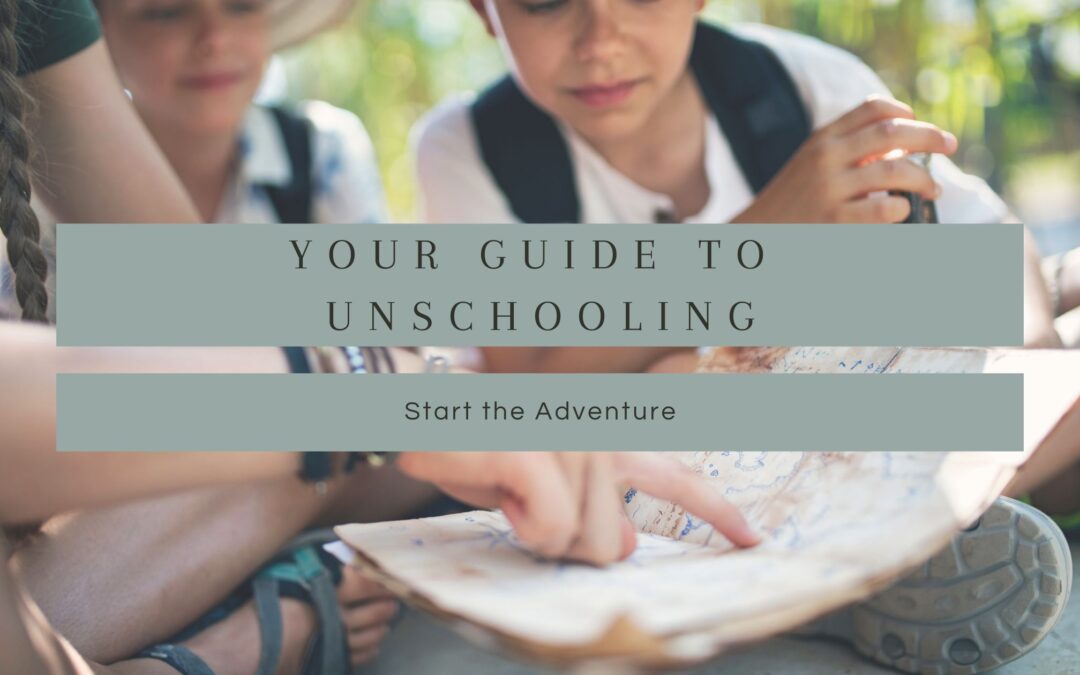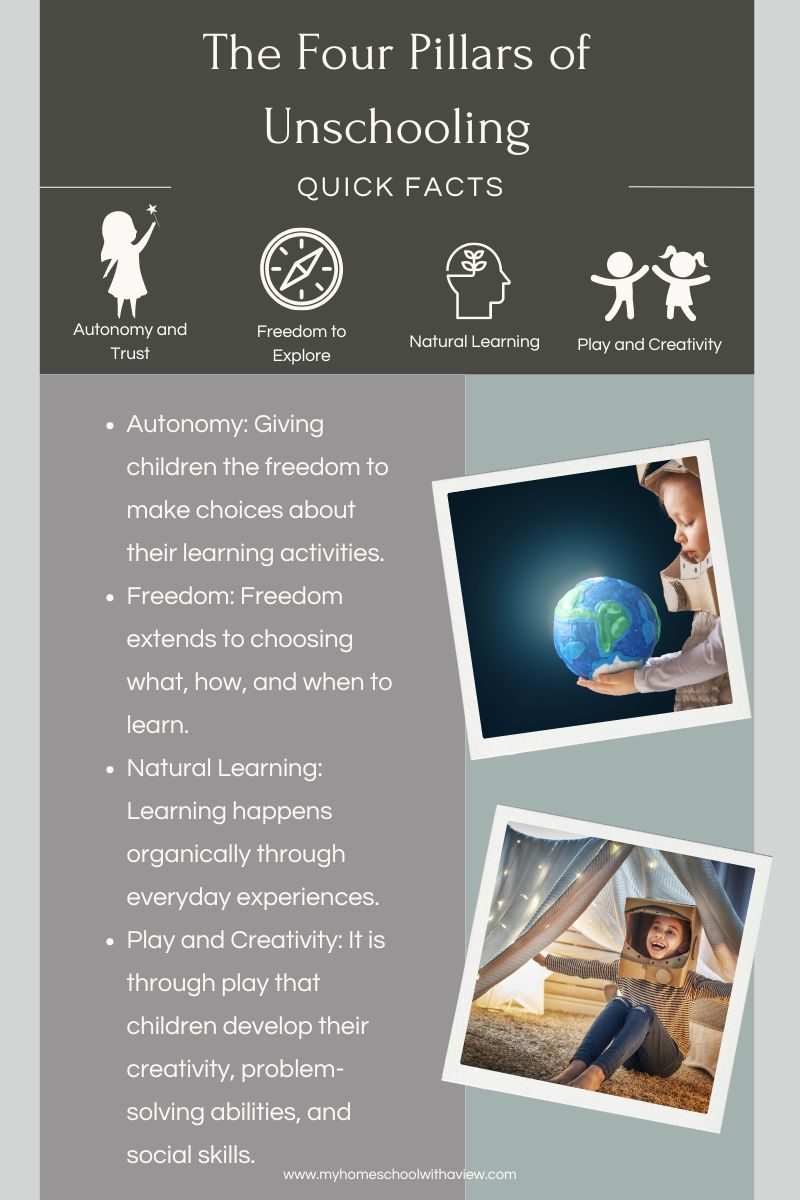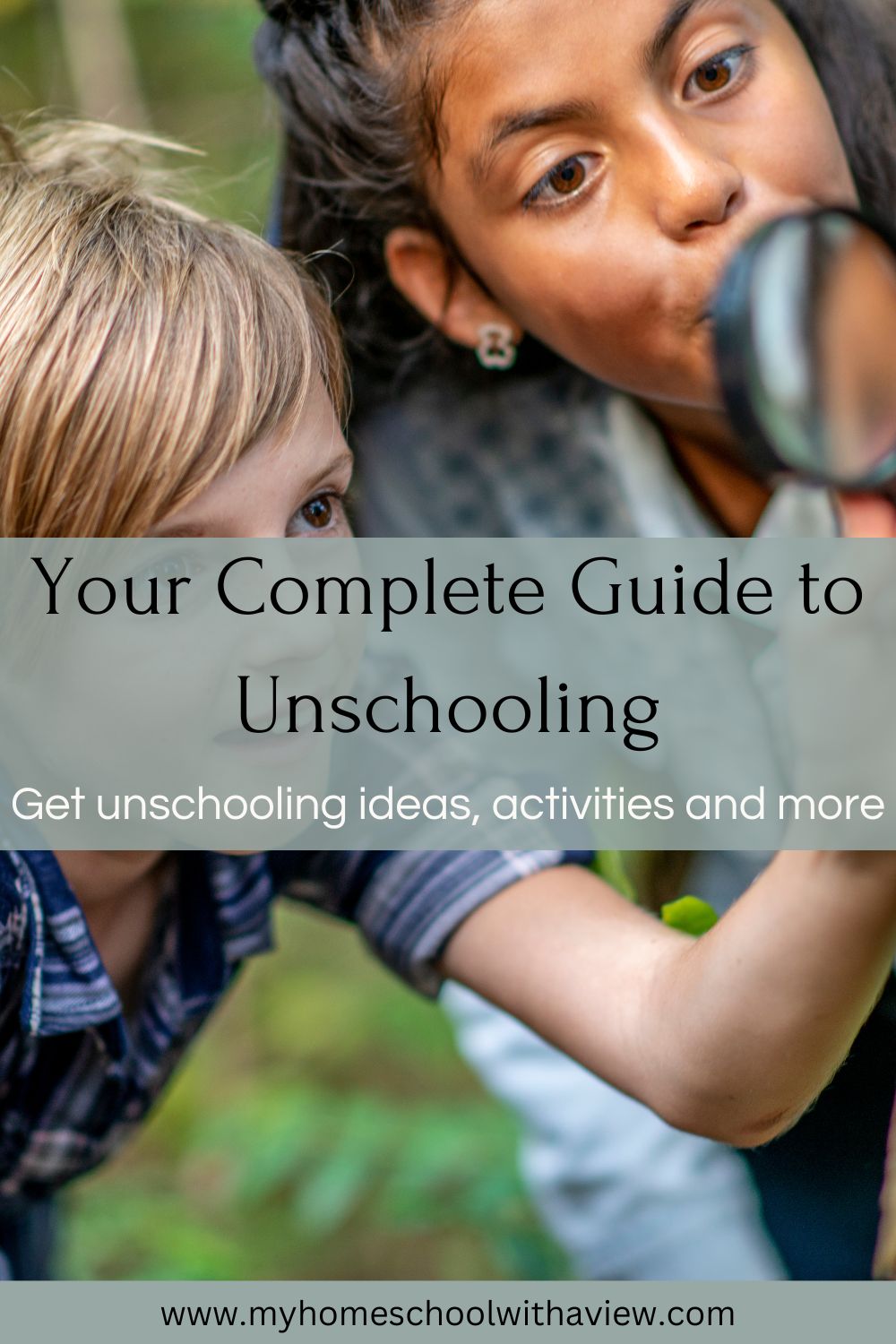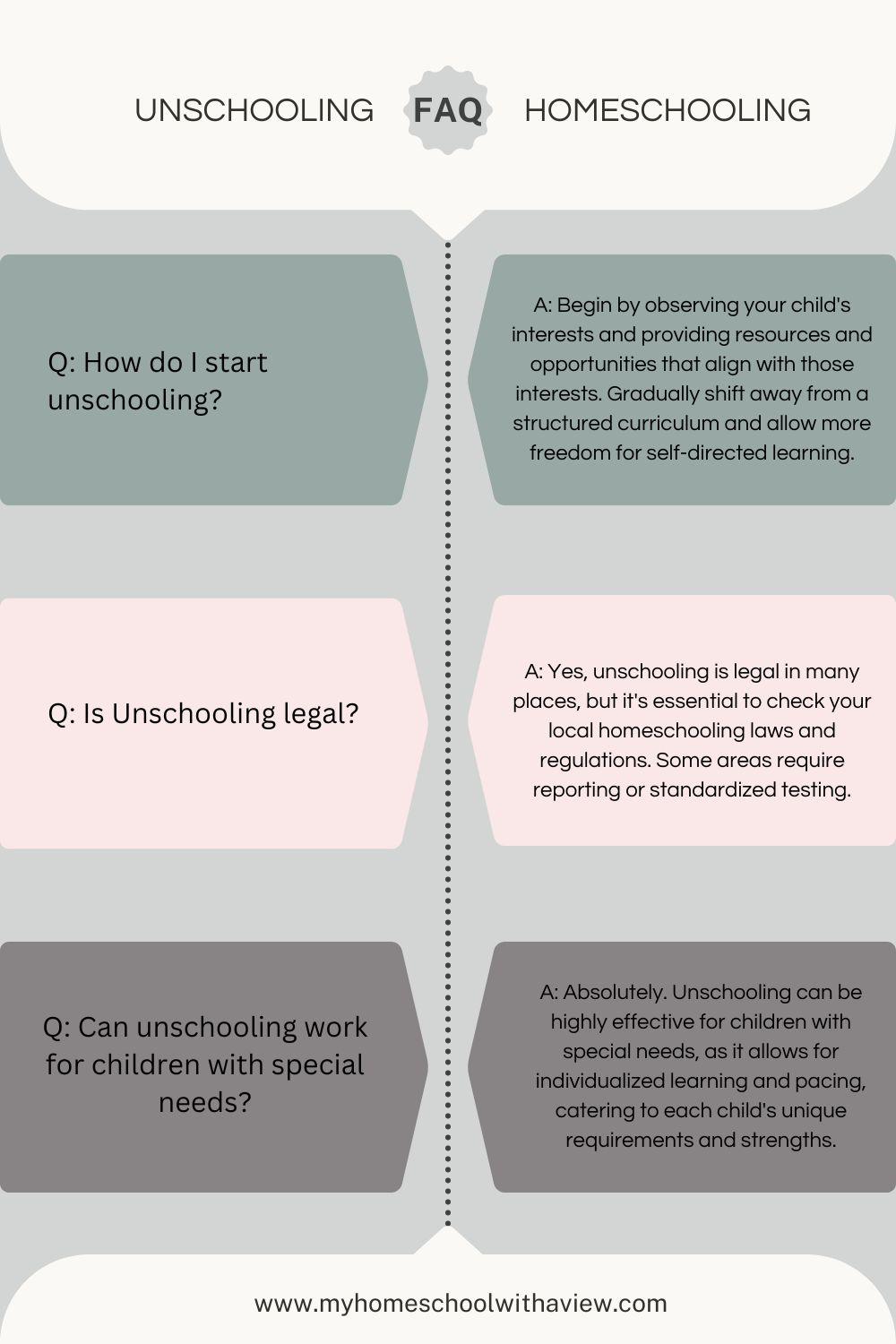This post is all about unschooling.
This post contains affiliate links and My Homeschool with a View, LLC participates in the Amazon Associates program. If you make a qualifying purchase through our links, we earn a commission at no additional cost to you . Thank you for supporting this site! You can read my affiliate and advertising disclosure here.
Unschooling, a unique and growing educational approach, is redefining the boundaries of homeschooling by encouraging a child-led, interest-driven learning environment. This method focuses on allowing kids the freedom to pursue their interests and learn at their own pace.
Unschooling seems unconventional, but it offers a fresh perspective on education that prioritizes the child’s natural curiosity and ability for natural learning.
In recent years, there has been a significant rise in the number of families choosing alternative school paths. Unschooling is one of those alternatives.
Many parents are seeking ways to break away from the rigid structure of school as we know it. Unschooling provides an answer by creating an environment where the child’s interests and passions drive their education.
This child-led learning approach encourages independent learning, critical thinking, and problem-solving skills.
In this post you will learn about unschooling, a unique approach to homeschooling. After reading, you will know what is unschooling, and how it differs from other approaches to homeschooling. You will also get unschooling ideas for different ages and stages.
What is Unschooling?
The Four Pillars of Unschooling
At its core, unschooling is a form of homeschooling that emphasizes learner-chosen activities as a primary means for education. Unlike traditional schooling, which adheres to a set curriculum and schedule, unschooling is built on the belief that children learn best when they are free to pursue their own interests and curiosities. This child-led approach encourages self-directed learning, allowing children to explore subjects that intrigue them without the constraints of formal education.
Autonomy and Trust
One of the fundamental principles of unschooling is autonomy. This means giving children the freedom to make choices about their learning activities and trusting that they will find valuable learning experiences in their pursuits.
Parents who practice unschooling believe that children are naturally curious and motivated to learn about the world around them. By providing an environment that supports this natural curiosity, unschooling allows kids to discover how to learn. This independent learning can last a lifetime.
Freedom to Explore
Unschooling emphasizes the importance of freedom in learning. This freedom extends to choosing what, how, and when to learn. Kids are not bound by a predetermined syllabus or timetable.
Instead, they have the flexibility to delve deeply into topics that capture their interest. For instance, a child fascinated by astronomy can spend days or even weeks exploring the subject through books, documentaries, and practical observations.
This deep dive not only satisfies their curiosity but also promotes a more profound understanding of the topic.
Natural Learning
Natural learning is another key principle of unschooling. This concept suggests that learning happens organically through everyday experiences rather than through structured lessons.
Children learn through play, household responsibilities, and community involvement. For example, cooking with a parent can teach measurements and fractions. A trip to the grocery store can involve budgeting and nutrition.
These real-world activities provide practical skills and knowledge that are directly applicable to daily life.
Play and Creativity
Play is a crucial component of unschooling, especially for younger children. It is through play that children develop their creativity, problem-solving abilities, and social skills. Unschooling encourages play as a legitimate and valuable form of learning.
Whether it’s building with blocks, role-playing, or outdoor exploration. Play offers endless opportunities for kids to engage their imagination and critical thinking skills.
History of Unschooling
Unschooling’s roots can be traced back to the 1960s with educational theorist John Holt. He believed that traditional schooling stifled children’s natural curiosity.
As a former teacher, he became disillusioned with the conventional education system after observing how it often hindered rather than helped children’s learning. He noticed that the rigid structure, standardized testing, and one-size-fits-all approach of schools suppressed children’s innate love of learning and curiosity about the world.
John Holt’s Contributions
John Holt’s revolutionary books, including How Children Fail and How Children Learn, proposed a radically different approach. Holt argued that children are naturally eager to learn and that they do so best in an environment where they are free to explore their interests without the pressure of grades and tests. His observations led him to conclude that forced learning often results in superficial understanding and disengagement.
While his ideas may seem radical to those who only know the traditional school model, I would argue that any mom who has homeschooled for a hot minute has probably come to this conclusion naturally. In fact, that is probably why you are reading this post.
Holt’s advocacy for a more child-led approach to education laid the groundwork for the unschooling movement. He encouraged parents to trust their children’s ability to direct their own learning and to create environments rich with resources and opportunities for exploration.
In the 1970s, Holt began to actively promote homeschooling as a legal and viable alternative to traditional schooling. He saw it as a way for parents to reclaim their children’s education from an increasingly bureaucratic and standardized system.
The Evolution of Unschooling
Over the decades, unschooling has evolved from Holt’s initial ideas into a widely recognized homeschool style. Early pioneers of unschooling were often seen as radical or unconventional. Like all homeschooling parents, they were driven by a desire to provide a more personalized and meaningful education for their children.
Unschooling In 2024
In the 21st century, unschooling has continued to grow. It’s gaining a dedicated following among parents who seek a more flexible, child-centered approach to education.
The movement has been bolstered by increasing dissatisfaction with traditional schooling, driven by concerns about standardized testing, overcrowded classrooms, and a lack of individualized attention. 2020 added another layer to this dissatisfaction.
Additionally, research has supported many of Holt’s original ideas, emphasizing the importance of self-directed learning and the negative impacts of excessive pressure and standardized assessments.
Moreover, the unschooling movement has diversified to include a range of approaches and philosophies. Some families practice radical unschooling, extending the principles of self-direction and autonomy beyond school to all aspects of life.
Others may blend unschooling with more traditional homeschooling methods, creating a hybrid approach that suits their family’s unique needs. I prefer this approach to radical unschooling. I think a balance of direction and autonomy creates well-rounded homeschool adventure.
Unschooling vs. Homeschooling
While homeschooling often follows structured curricula, unschooling departs from this by allowing children to guide their own homeschool adventure. Traditional homeschooling might involve a set schedule and predetermined subjects. In contrast, unschooling trusts kids to decide what, when, and how they want to learn.
Both approaches offer benefits and challenges. Other homeschool styles provide structure and predictability, while unschooling fosters independence and deep, personalized learning.
Benefits of Unschooling
Personalized Learning
Unschooling offers numerous benefits, from personalized learning to enhanced creativity and critical thinking skills. It caters to individual learning styles and paces, allowing children to focus on their strengths and interests.
This personalized approach helps children develop a love for learning. Kids get to engage deeply with subjects they are passionate about.
Freedom and Flexibility
Flexibility is a key advantage of unschooling. There are no rigid schedules, allowing families to adapt learning to their daily lives.
This flexibility makes it easier to balance education with family activities and responsibilities. Kids can learn anywhere and anytime, turning everyday life into valuable educational experiences.
Creativity and Critical Thinking
Unschooling encourages exploration and curiosity, leading to creativity and critical thinking. Children are free to ask questions, solve problems, and think outside the box. This environment nurtures innovative thinking and helps children develop creative problem solving skills.
Unschooling Ideas and Activities
Everyday Learning Opportunities
The beauty of unschooling lies in its dynamic activities that engage kids in learning. Everyday chores and routines can become educational experiences, transforming mundane tasks into opportunities for growth and discovery. Here are some specific examples of how unschooling can turn daily life into a rich learning environment:
Cooking and Baking
Cooking and baking are excellent ways to incorporate a variety of educational elements. When children help in the kitchen, they engage in practical math lessons through measuring ingredients, doubling recipes, and dividing portions.
They also learn about science through observing chemical reactions, such as how yeast makes bread rise or how heat changes the consistency of ingredients.
Additionally, cooking provides lessons in nutrition and health, helping children understand the importance of a balanced diet.
Example: A child making cookies can practice fractions by measuring out 1/2 cup of sugar, learn about the states of matter by melting butter, and explore cultural studies by preparing traditional recipes from different countries.
Gardening
Gardening offers hands-on learning experiences in biology, ecology, and environmental science. Children learn about plant life cycles, soil composition, and the importance of water and sunlight for growth.
Gardening also teaches responsibility and patience, as children must regularly tend to their plants and wait for them to grow. Moreover, it can spark discussions about sustainability and where our food comes from.
Example: Planting a vegetable garden allows a child to observe the growth process from seed to harvest, understand photosynthesis, and learn about different plant species. They can also experiment with variables like soil type and watering schedules to see how they affect plant health.
Grocery Shopping
A trip to the grocery store can be a surprisingly rich educational experience. Children can practice math skills by comparing prices, calculating totals, and making change.
They can also learn about nutrition by reading food labels and making healthy choices. Additionally, grocery shopping can introduce economics and budgeting.
Example: Give your kids a budget and a list of items to purchase. They can plan meals, compare prices per unit, and decide how to spend their money wisely.
This activity also encourages critical thinking and problem-solving as they navigate the store and prioritize their purchases.
Project-Based Learning
Project-based learning is a cornerstone of unschooling, allowing children to dive deeply into topics that interest them. This approach transforms curiosity into hands-on projects, encouraging exploration, creativity, and problem-solving.
Successful projects are driven by the child’s interest and choice, with parents providing resources, guidance, and encouragement. Here are some examples of how project-based learning can be implemented in an unschooling environment:
Building a Robot
A child fascinated by technology and engineering might choose to build a robot as a project. This incorporates a variety of subjects, including science, technology, engineering, and math (STEM).
The child learns about electrical circuits, programming, and mechanical design while developing problem-solving skills and perseverance.
Example: Start with a simple robot kit to learn the basics of assembly and programming. As the child’s skills progress, they can move on to more complex projects, such as creating a robot that can perform specific tasks or respond to environmental cues.
Along the way, they might research different types of sensors, explore coding languages like Python or C++, and experiment with various materials for constructing the robot’s body.
Creating a Garden
Gardening is an excellent project that combines biology, ecology, and environmental science. If your child is interested in nature the can create a garden. The will learn about plant life cycles, soil health, and the importance of biodiversity.
Example: Start with planning the garden layout, selecting appropriate plants for the climate and soil type, and learning about companion planting. Your kids can document the growth of their plants, keep a gardening journal, and even conduct experiments, such as comparing the effects of different fertilizers.
They might also explore concepts like composting, water conservation, and organic gardening practices.
Writing and Publishing a Book
If your child has a passion for storytelling and writing they might embark on a project to write and publish their own book. This project involves language arts and digital literacy.
They will learn about narrative structure, character development, and the publishing process.
Example: Begin with brainstorming and outlining the story, then move on to writing the manuscript.
The child can revise and edit their work, learning about grammar and writing techniques. Once the book is complete, they can explore options for self-publishing, such as creating an e-book or printing physical copies.
Along the way, they might design a book cover, create marketing materials, and even set up a website to promote their work.
Travel and Field Trips
Travel and field trips offer educational benefits by exposing our kids to new environments and cultures. Planning trips, visiting historical sites, and exploring nature all contribute to a child’s learning.
While I don’t consider myself an unschooler, there are times throughout homeschooling that we have taken time off for travel. I feel like these experiences are valuable enough to abandon the books and immerse ourselves in cultural opportunities.
These experiences can spark new interests and provide real-world context to academic subjects.
Unschooling at Different Stages
Early Childhood (Ages 3-7)
Unschooling grows with the child, adapting to their developmental stages and changing interests. During early childhood, the focus is on play-based learning and exploration.
Young children learn through play, which helps develop their cognitive, social, and motor skills. Simple activities like playing with blocks, drawing, and exploring nature provide rich learning experiences.
Middle Childhood (Ages 8-12)
In middle childhood, children balance structured activities with freedom. They begin to explore their interests more deeply and can take on more complex projects.
Encouraging deeper exploration of interests helps children develop expertise and confidence in their abilities. Activities like science experiments, book clubs, and creative writing can be particularly engaging.
Unschooling High School
Unschooling during the high school years requires a thoughtful approach to ensure readiness for adulthood and future aspirations. While unschooling can be great during the early years of homeschooling, I recommend taking a bit more of a structured approach to homeschooling high school.
State graduation requirements and your homeschooler’s future plans should all be considered while creating a plan for high school. Interest led learning in the form of choosing topics and subjects of interest can still work well in high school. But thoughtful care should be taken to make sure that you will be able to create a transcript that will set your kids up for a strong start as they launch into adulthood.
Overcoming Challenges in Unschooling
Record Keeping and Assessment
Record keeping and assessment can be challenging without traditional tests and book work. However, there are methods for documenting learning progress.
You can try keeping journals, creating portfolios, and taking photos or videos of projects. I also recommend keeping attendence records, because unschooling can still count as school.
If you want to have a more structured approach to assessments or if you need to keep records in your state, alternative assessment strategies might include self-evaluation, peer reviews, and presentations.
Parental Roles and Responsibilities
Parents play a crucial role in unschooling, balancing guidance with freedom. You need to ensure a supportive and resource-rich environment where your kids are encouraged to explore.
Parents also serve as facilitators, helping children access information and resources and providing the support needed to pursue their interests.
Resources for Unschooling Families
Books and Websites
Numerous resources are available to support unschooling families on their educational journey. Recommended reading includes books by John Holt, such as How Children Learn and Teach Your Own. Websites like unschooling.com and online communities offer valuable information and support.
Unschooling Conferences and Events
Unschooling conferences and events provide opportunities to connect with other families, share experiences, and gain new insights. Notable events like the Life is Good conference offer workshops and activities for both parents and children.
Support Networks and Co-ops
Support networks and co-ops are a bonus for unschooling families. Local support groups offer a sense of community and shared resources. Collaborating with other unschooling families enhances the learning experience through group activities and shared projects.
Frequently Asked Questions (FAQ) About Unschooling
Q: How do I start unschooling my child?
A: Begin by observing your child’s interests and providing resources and opportunities that align with those interests. Gradually shift away from a structured curriculum and allow more freedom for self-directed learning.
Q: Is unschooling legal?
A: Yes, unschooling is legal in many places, but it’s essential to check your local homeschooling laws and regulations. Some areas require reporting or standardized testing.
Q: How do unschooled children transition to college?
A: Many unschooled students successfully transition to college by creating portfolios, taking standardized tests like the SAT or ACT, and sometimes enrolling in community college courses during their high school years.
Q: Can unschooling work for children with special needs?
A: Absolutely. Unschooling can be highly effective for children with special needs, as it allows for individualized learning and pacing, catering to each child’s unique requirements and strengths.
This post is all about unschooling.
Other posts you may like:
What You Need to Know About the Classical Homeschooling Method – My Homeschool with a View
Charlotte Mason Homeschooling: Unveiling a Beautiful Education – My Homeschool with a View





